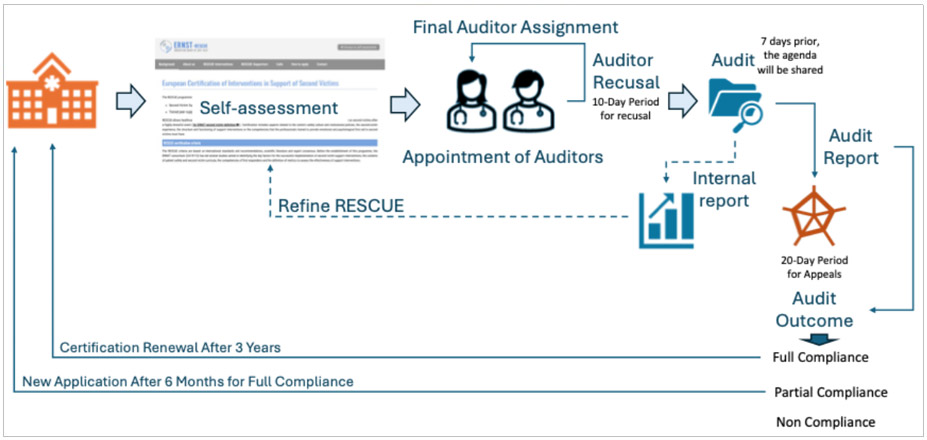How to apply
RESCUE Certification Standards for Second Victims Support include two complementary certification systems: the certification system for second victim support interventions (RESCUE-Intervention) and the certification system for training peer supporters (RESCUE-Training). They have been designed to be applied in hospitals, primary care, and long-term care settings, including nursing homes and social-healthcare centers.
RESCUE is the result of the work conducted by the European Researchers’ Network on Second Victims (ERNST), funded by the European Cooperation in Science and Technology (COST), and validated in practice through the Innovative Grant IG19113, also funded by COST. As a general rule, the audit covers actions designed or implemented over the past three years. The certification remains valid for a period of three years, after which institutions wishing to maintain their certification must apply for renewal.
The RESCUE Certification Standards incorporate both Elementary and Advanced standards.
Certification is granted if all CORE standards are met and at least 75% of the standards are fulfilled. Partial compliance applies to cases where the unmet or incomplete elements are minor and do not compromise the overall purpose or objectives of the standard. The support application's algorithm on the RESCUE platform facilitates the correct implementation of this instruction.
Procedure for Applying for RESCUE Certification
How and When to Apply for Certification
Institutions seeking RESCUE certification may submit their application at any time through the RESCUE platform in this website.
To initiate the process, the institution must designate a local certification coordinator or promoter who will serve as the primary point of contact with the ERNST Consortium and the assigned auditors. The application must include the results of the self-assessment (accessible via the self-assessment tool on the RESCUE website).
The candidate must indicate whether the institution trains its own peer supporters, relies on external peer supporters, or is exclusively focused on training peer supporters.
By submitting the application, the institution agrees to the terms of the certification procedure. The decision issued by the RESCUE Core Group will be final and non-appealable.
Within 20 days of submission, the promoter will be informed whether the initial certification requirements are met and will receive a proposed list of auditors. The promoter will have 10 days to challenge the proposed auditors in case of incompatibility. Once the audit team is confirmed, the evaluation date will be scheduled, including an on-site visit to the institution in all cases.
At least 7 days in advance, the audit team will provide the visit agenda and specify any additional documentation required.
Only certified institutions will be listed on the RESCUE website. Applications will not be made public or recorded on open platforms.
Audit Panel
RESCUE maintains a panel of auditors who have completed specific training as RESCUE auditors.
Auditors operate with full independence and strict confidentiality in accordance with the RESCUE Code of Ethical Conduct (available at https://cost-rescue.eu).
Audit Process
The audit takes a maximum of one and a half days. The agenda includes:
- Review of work schedules.
- Examination of required documentation.
- Scheduled interviews with the promoter, the support team, managers, peer supporters, and other relevant groups.
Under no circumstances will interviews be conducted with second victims.
Within 20 days of the audit, the audit team will provide the promoter with provisional report of the audit results. The promoter will have 10 days to submit any objections. The audit team will then have 20 days to submit its final report to the RESCUE Core Group, which will issue a final and non-appealable decision. In this case, the members of the Core Group affected by a conflict of interest should abstain from the decision. Starting in January 2026, an Audit Committee will be appointed, which will take over this function, replacing the RESCUE Core Group.
If partial certification is granted, the promoter will have up to 6 months to implement improvements and reapply. If certification is denied, the institution may not reapply for one year.
Procedure Costs
Until October 31, 2025, all costs associated with the audits will be covered by the Innovative Grant 19113, funded by COST (European Cooperation in Science and Technology).

Figure 1. Critical steps in the procedure
Language Policy
The official language of the RESCUE certification process is English. All official communications, documentation, and procedures will be conducted in English. However, audits may be carried out in the candidate's language, where applicable. Additionally, the final result report may be translated into the local language by the auditors as a courtesy to the candidate.
Access the registration tool




